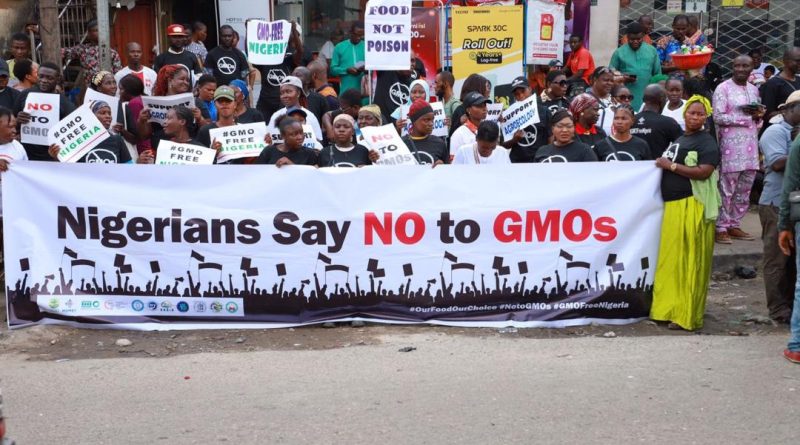Stakeholders: Unchecked GMOs Will Undermine Nigeria’s Food sovereignty
By Bukar BOLORI
Stakeholders have warned Nigeria on toying with genetically modified organisms (GMOs) food, asking the government to determine the model of agriculture to embrace.
They raised the alarm they allowing genetically modified organisms without proper checks would undermine the nation’s food sovereignty.
The stakeholders while advocating for the ban of GMOs in the country at the National Symposium on GMOs held in Abuja, said: “Nigeria is at a critical point where we must decide on the way forward for food sovereignty. We must decide which model of agriculture suits our context and meets our needs between industrial agriculture (dependent on GMOs and synthetic chemical inputs) powered by multinational corporations and an agroecological system powered by the local farmers who provide over 70% of our food.”
They insisted that: “Nigeria’s traditional agricultural practices, including seed selection, mixed cropping, crop rotation, and natural soil fertility management, have historically sustained food systems without external dependencies. The introduction of GMOs which thrive in monocultures is systematically displacing proven agricultural practices and undermining our food sovereignty.
“GMOs represent a paradigm shift in agriculture; they are not just an option or solution. We must think beyond the mythical temporary relief that is imagined or promised and consider what long term impacts they portend.”
The meeting which was attended by more than 80 participants from government, academia, civil society, local farming communities, environmental groups, the private sector and the media, brought together by Health of Mother Earth Foundation (HOMEF), Environmental Rights Action and the GMO-Free Nigeria Alliance, noted that BT Cotton, the first GMO crop officially introduced in Nigeria, after three years of planting has not shown any advantage over conventional varieties but rather has brought about soil degradation as reported by the Cotton Farmers Association in Nigeria in 2024.
They added in a communique that: “Countries like Tanzania have achieved food security by over 128% through traditional and organic methods without GMOs, demonstrating viable alternatives for Nigeria.
“Several scientific studies link the consumption of GMOs with birth defects, immune disorders, tumours and other diseases. The claims that there’s no research confirming negative impact of GMOs on human health is outrageous and simply false.
“In Nigeria however, in spite of the intense controversy and examples of over 30 countries that have banned GMOs, the regulatory agency, NBMA has not conducted adequate, independent and long-term risk assessment before the approvals granted so far.
“The cultivation of GMOs threatens serious biodiversity loss and creation of uncontrollable genetic mutations in plant varieties.
“GMO technology creates seed monopolies that transfer right to seeds from farmers to multinational corporations.
“Small-scale farmers, who constitute the majority of Nigeria’s agricultural workforce and who produce over 70% of Nigeria’s food are at high risk from the introduction of patented GM seeds with restrictions on saving and sharing.”
They argued that: “Agroecology presents a viable solution to Nigeria’s food system challenges by ensuring increased productivity, soil fertility improvement and empowerment of local food producers.”
They said: “We must decolonise our agricultural system through the preservation of our indigenous crop and animal varieties, our traditional knowledge and by taking control of our food be it in decision making, science or practice.”
At the end of the symposium, the participants (stakeholders) unanimously called on the Federal Government to: Impose a moratorium on all new GMO approvals as extensive evidence exists to confirm their serious negative implications on human and environmental health as well as on our economy; Review the National Biosafety Management Agency (NBMA) Act to include stronger safeguards, independent oversight, and meaningful public participation; Address the issue of food loss as recent studies show that up to 40% of Nigeria’s food goes to waste due to lack of proper processing and storage facilities; Strengthen agricultural infrastructure to reduce post-harvest losses and improve food distribution.
They also called for the support of small-scale farmers through improved access to land, credit, markets, extension service and non-GMO seeds; Revive and support the Nigerian agricultural extension service system; Address root causes of food insecurity including terrorism, poor infrastructure, inequalities and market inefficiencies; Invest massively in agroecology and traditional farming systems that have proven effective and sustain-able.
They also called on the Federal Ministry of Agriculture to promote and actualise the set up of seed banks and gene banks at Local Government and state levels to ensure the preservation of Nigeria’s genetic resources.
They called on regulatory agencies to: Prioritize public health over commercial interests in all regulatory decisions; Ensure rigorous testing of all GMO products with transparent reporting of results; Implement robust monitoring systems to track long-term effects of approved GMOs; and engage meaningfully with civil society, farmers, independent scientists and other stakeholders in decision-making processes.
The stakeholders also called on the National Assembly to: Amend the NBMA Act 2015 to enforce stronger democratic oversight and precautionary measures; Pass a comprehensive legislation requiring mandatory suspension of GMOs and strict liability for damages; Appropriate adequate funding for independent research on healthy, inclusive and sustain-able agriculture alternatives; and establish parliamentary oversight on GMO regulation and approval processes.
Nigerians, they asked to exercise their rights and demand for a ban on GMOs for a healthy, just and sustain-able food system.




